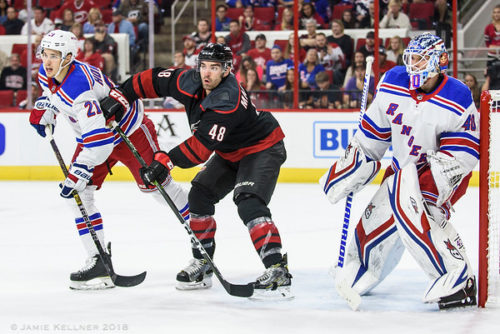Cam Ward is yet another story of a Carolina Hurricanes star bursting onto the NHL scene from seemingly out of nowhere. Ward was drafted 25th overall in the 2002 draft. He was expected to someday become an NHL goalie. But the chain of events leading up to it seemed to suddenly fall out of the sky. After being drafted, Ward spent two more years in juniors and then quietly had a solid AHL season in 2004-05 under cover of the NHL lockout. Despite the fact that Ward had no NHL experience whatsoever and only one season of AHL experience, Canes general manager Jim Rutherford decided to go with him as the team’s backup for the 2005-06.
Coming off a miserable previous season before the lockout, the Canes needed a decent start out of the gate to build confidence and put 2003-04 behind them. Those prospects took a significant turn for the worse almost immediately when starting goalie Martin Gerber was injured two periods into the season. Cam Ward was suddenly scheduled to make his first NHL start in only his second NHL appearance at the age of 21 on October 7, 2005 in the Canes home opener. The foe was a Penguins team that featured all-time NHL great Mario Lemieux and soon-to-be NHL all-time great Sidney Crosby. In that game, Ward looked remarkably calm, as if he was ready and belonged there. He played well and helped get the Canes to overtime tied at 2-2 and gain a point in the standings in the process. Then after a scoreless overtime, Ward rose up and stopped Mario Lemieux, Sidney Crosby and Ziggy Palffy to earn a shootout victory. What a way to start an NHL career! Before turning the reins back over to Martin Gerber, Ward went 6-1-1, doing his part to help the Canes put the 2003-04 season behind them, start anew and begin to build confidence. He took regular turns mostly in the backup role through the rest of the season and finished with a solid 14-8-2 record.
Ward started the playoffs as the backup, but just like the regular season, he quickly found himself parachuting into a dire situation. After a Gerber loss in the playoff opener and a couple early goals allowed in game two, Ward entered in relief. The team responded with a surge to come back but when Montreal won game two in overtime, the Canes were suddenly staring at 0-2 and had blown both games at home to boot. Just like in the regular season, Cam Ward rose to the occasion running off a string of four tense wins of 2-1, 3-2, 2-1 and 2-1. Two of the wins were in overtime. Under the brightest of lights and the greatest pressure, Cam Ward again was as cool as a cucumber and seemed to thrive in intense situations. In a playoff run filled with tight games, overtime pressure and heroics and a couple long series, Ward was consistently one of the Canes best players. He won game seven in both the Eastern Conference Finals and Stanley Cup Finals. He won four games in overtime. He gave up zero or one goal in regulation in eight games. And in the end he won both the Stanley Cup and the Conn Smyth trophy as the playoff most valuable player. When he accepted the trophies on June 19, 2006, he was a 22-year old NHL rookie. By this time, he had already cemented his place in Hurricanes hockey history and was looking at a long NHL career in front of that.
Following the Stanley Cup championship, Ward was immediately elevated a core role in the future of the franchise and became a face of the team with the fan base and team marketing. And once the frenetic pace of the 2005-06 ended and everyone had time to catch a breath it became clear to everyone close to the team how solid of a person Cam Ward was too. There was no primadonna, arrogance or even much weird goalie stuff with Cam Ward. He was humble as a player and also great in the community.
On the ice, he was given the starter’s role for the 2006-07 as Gerber was allowed to leave for Ottawa. As a full-time starter, Ward collected 30 wins in the 2006-07 season and built from there collecting 37 and then 39 wins respectively in 2007-08 and 2008-09. The 2008-09 win total of 39 is still a team record (as of August 2015). Ward was phenomenal down the stretch in March and April of 2009 and helped boost the Canes back into the playoffs.
The Hurricanes entered the 2009 playoffs as an underdog and faced a familiar playoff foe in New Jersey. For the second time Ward was pitted against future Hall-of-Famer Martin Brodeur. Against Brodeur and the Devils Ward boasted a 0.938 save percentage and a goals against average barely north of two. And when the chips were down, he was better than Brodeur in a decisive game seven on the road. Ward was equally clutch in the second round against Boston, winning two overtime games including the decisive game seven, again on the road. By the end of the series, Ward had collected some astonishing stats that included a 6-0 record in terms of winning series and a clutch 4-0 record in playoff game sevens including the last two on the road. The Hurricanes ran out of gas and lost in a disappointing sweep in the Eastern Conference Finals against eventual champion Pittsburgh, but along the way Cam Ward had established himself as a good and incredibly clutch NHL goalie.
Ward has had two more 30-win seasons with 37 wins in 2010-11 and 30 more in 2013-14. He has been the Hurricanes starting netminder much more often than not for a full decade and played in his 500th game as a Carolina Hurricane on February 24, 2015. From this long run as the Canes goalie, Ward sits atop the leader board in almost every Hurricanes goaltending category. His 512 games played and 246 wins (as of August 2015) both rank first in Hurricanes hockey history. The win total is nearly double Arturs Irbe’s second place total of 130.
Cam Ward does deserve credit for his longevity in net in Raleigh, but more significantly he should be recognized as an all-time Hurricanes great for being at his best under the pressure of the playoffs to the tune of two great playoff runs and one Stanley Cup victory.
Go Canes!



